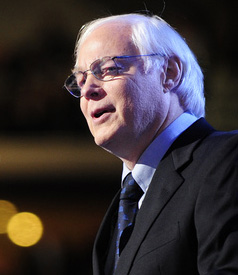Washington – The most surprising and disappointing aspect of our politics is how little pushback there has been against the vile, extremist rhetoric that has characterized such a large part of the anti-Obama movement.
President Obama’s administration has largely ignored those accusing him of “fascism” and “communism,” presumably believing that restraint in defense of dignity is no vice.
Republican politicians, worried about future primary fights, have been reluctant to pick a fight with a radical right that seems to be the most energized section of their party. Their “moderation” has consisted of a non-benign neglect of the extremists, and of accusing the president merely of “socialism.”
And so it is that the first genuinely ringing call for moderation has come from a man who is effectively without a party, and whose own demeanor and career define temperance.
Jim Leach spent 30 years as a Republican member of Congress who went his own way. If this meant standing almost alone against his caucus, he was content to do so.
But he was never bombastic about it, as befits an extravagantly understated guy. The characteristic Leach look is a comfortable sweater worn under a tweed jacket, in season and out. That’s about as fashionable as the persona of old Mr. Chips, the warmhearted and mildly Victorian headmaster who was the hero of James Hilton’s 1934 novel.
Leach lost his Iowa seat in the 2006 Democratic tide, but he emerged relieved rather than bitter. He turned to academia, not the lobbying trade favored by so many other defeated politicians, and in 2008 engaged in the ultimate act of a maverick (a real one) by becoming a Republican for Obama. The new president in turn appointed Leach chairman of the National Endowment for the Humanities.
It was in this role that Leach offered his critique of extremism in a speech at the National Press Club titled “Bridging Cultures” a few days before Thanksgiving. It deserves far more attention than it has received.
“Little is more important for the world’s leading democracy in this change-intensive century,” Leach argued, “than establishing an ethos of thoughtfulness and decency of expression in the public square.
“If we don’t try to understand and respect others, how can we expect them to respect us, our values and our way of life?”
But our own political practice belies anything remotely like “civility,” a word that Leach has as much a right to use as anyone in public life.
“It is particularly difficult not to be concerned about American public manners and the discordant rhetoric of our politics,” he declared. “Words reflect emotion as well as meaning. They clarify — or cloud — thought and energize action, sometimes bringing out the better angels in our nature, sometimes lesser instincts.”
But what are we doing in this great democracy? “Public officials,” Leach observed, “are being labeled ‘fascist’ or ‘communist.’ And more bizarrely, significant public figures have toyed with hints of history-blind radicalism — the notion of ‘secession.'” This last is a reference to Texas Gov. Rick Perry’s effort to ride to re-election by invoking a concept that we thought had been discredited in 1865.
Leach has no problem with a vigorous debate, but he’s right that much of what passes for argument right now is mere calumny.
“There is, after all, a difference between holding a particular tax or spending or health care view,” he said, “and asserting that an American who supports another approach or is a member of a different political party is an advocate of an ‘ism’ of hate that encompasses gulags and concentration camps. One framework of thought defines rival ideas; the other, enemies.”
As a result, “citizens of various philosophical persuasions are reflecting increased disrespect for fellow citizens and thus for modern day democratic governance.”
Leach still has a lot of the old moderate Republican in him, and he is critical of a political system that, by creating so many safe one-party seats, has produced strong incentives for politicians “to remain firmly positioned far from the center.” He adds: “Institutional polarization is the inevitable result.” That’s true, too.
Leach’s speech is the kickoff for a 50-state “civility tour,” and my hunch is that this very civil man may have to put up with a lot of incivility along the way. It’s strange that a call to consider respecting each other more might become a controversial endeavor. This is precisely why Leach’s witness to moderation requires an immoderate dose of courage.
(c) 2009, Washington Post Writers Group
Join us in defending the truth before it’s too late
The future of independent journalism is uncertain, and the consequences of losing it are too grave to ignore. To ensure Truthout remains safe, strong, and free, we need to raise $27,000 in the next 24 hours. Every dollar raised goes directly toward the costs of producing news you can trust.
Please give what you can — because by supporting us with a tax-deductible donation, you’re not just preserving a source of news, you’re helping to safeguard what’s left of our democracy.
